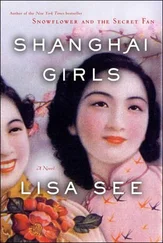Lisa See - Peony in Love
Здесь есть возможность читать онлайн «Lisa See - Peony in Love» весь текст электронной книги совершенно бесплатно (целиком полную версию без сокращений). В некоторых случаях можно слушать аудио, скачать через торрент в формате fb2 и присутствует краткое содержание. Жанр: Старинная литература, на английском языке. Описание произведения, (предисловие) а так же отзывы посетителей доступны на портале библиотеки ЛибКат.
- Название:Peony in Love
- Автор:
- Жанр:
- Год:неизвестен
- ISBN:нет данных
- Рейтинг книги:4 / 5. Голосов: 1
-
Избранное:Добавить в избранное
- Отзывы:
-
Ваша оценка:
- 80
- 1
- 2
- 3
- 4
- 5
Peony in Love: краткое содержание, описание и аннотация
Предлагаем к чтению аннотацию, описание, краткое содержание или предисловие (зависит от того, что написал сам автор книги «Peony in Love»). Если вы не нашли необходимую информацию о книге — напишите в комментариях, мы постараемся отыскать её.
Peony in Love — читать онлайн бесплатно полную книгу (весь текст) целиком
Ниже представлен текст книги, разбитый по страницам. Система сохранения места последней прочитанной страницы, позволяет с удобством читать онлайн бесплатно книгу «Peony in Love», без необходимости каждый раз заново искать на чём Вы остановились. Поставьте закладку, и сможете в любой момент перейти на страницу, на которой закончили чтение.
Интервал:
Закладка:
He held my elbow, since some of the rocks were slick with moss. I felt the heat of his hand through the silk of my sleeve. Warm air lifted my skirt as though it were a cicada’s wing carried by the wind. I was out. I was seeing things I’d never seen before. Here and there, bits of vines and branches draped over our compound wall, hinting at what was hidden inside. Weeping willows hung over the lake, their tendrils teasing the water’s surface. I brushed against wild roses blooming on the bank and their scent infused the air, my clothes, my hair, the skin on my hands. The feelings that rushed through my body were nearly overwhelming: fear that I would be caught, exhilaration that I was out, and love for the man who had brought me here.
We stopped. I wasn’t sure how long we’d been walking.
“My house is there,” he said, pointing across the lake, past the newly built pavilion on Solitary Island that I could see from my father’s library.
“There’s a temple on the hill. It’s lit by torches this evening. Do you see it? The monks open their doors for all festivals. Just a little up and to the left is the house.”
“I see it.”
The moon was just a sliver, but it was enough to cast a path across the lake from my toes to his doorstep. It felt as though the heavens had agreed that we were meant to have this time together.
In this most extraordinary circumstance, I was distracted by a peculiar sensation. My lily shoes were thoroughly soaked and I could feel water being drawn up into the hem of my skirt. I took a tiny step back from the water’s edge, which sent ripples out across the peaceful surface. I thought about those ripples hitting the hulls of boats that carried other lovers on the lake and lapping at the edges of moon-viewing pavilions where young husbands and wives had sought refuge from the watchful eyes of the household.
“You’d like my home,” he said. “We have a nice garden—not as large as yours—with a small rockery, a moon-viewing pavilion, a pond, and a plum tree whose blossoms in spring fill the entire compound with an enticing fragrance. Whenever I see it, I’ll think of you.”
I wished we would have a wedding night. I wished it would happen ( 6 2 )
right now. I blushed and looked down. When I looked up, he stared into my eyes. I knew he longed for the same thing I did. And then the moment was over.
“We must return,” he said.
He tried to hurry us, but my shoes were now slippery and I was slow.
As we got closer to the villa, the sounds of the opera came more fully into my consciousness. Mengmei’s pained cries as he was tortured and beaten by Prefect Du’s guards told me we were close to the end.
He lifted me up and back into the Moon-Viewing Pavilion. This was it.
Tomorrow, I would go back to preparing for my marriage, and he would go back to whatever young men do to get ready to greet their wives.
“I liked talking to you about the opera,” he said.
They may not seem like the most romantic words a man could have spoken, but to me they were, for they showed that he cared for literature, the concerns of the inner chambers, and that he truly did want to know what I thought.
He picked up the willow sprig and handed it to me. “Keep this,” he said, “to remind you of me.”
“And the peony?”
“I’ll keep it forever.”
I smiled inwardly, knowing that the flower and I shared the same name.
He brought his lips close to mine, and when he spoke his voice trembled with emotion. “We had three nights of happiness. That’s more than most married couples have in a lifetime. I will remember them forever.”
As my eyes filled with tears, he said, “You must go back. I won’t leave here until there’s a safe distance between us.”
I bit my lip to keep from crying and turned away. I walked alone toward the main garden, stopping by the pond to tuck the willow sprig inside my tunic. Only when I heard Prefect Du accuse his daughter, who’d been brought before him, of being a disgusting creature of the dead did I remember how sullied my shoes, leggings, and the bottom of my skirt had become. I needed to get back to my room and change without being seen.
“Here you are,” Broom said, stepping out of the shadows. “Your mother sent me to look for you.”
“I was . . . I had to . . .” I thought of Willow that first night as she played the role of Spring Fragrance. “I had to use the chamber pot.”
My cousin smiled knowingly.
“I’ve been to your room. You weren’t there.”
( 6 3 )
Having caught me in a lie, Broom regarded me suspiciously. I watched her smile broaden as her eyes traveled from my face down across my torso to my skirt, my dirty hem, and my soiled shoes. She pasted a bright mask on her face, looped her arm affectionately through mine, and said in a pretty tone, “The opera is nearly finished. I don’t want you to miss the end.”
I was light-headed enough with my own private happiness to believe she wanted to help me. Whatever hidden strength had surfaced when I allowed myself to go over the balustrade of our Moon-Viewing Pavilion had retreated to a hidden corner deep inside me, because I didn’t break away from Broom and sit down on my cushion at the back of the audience but allowed myself to be led—helplessly, stupidly, but with the ridiculous in-vincibility that came with the bliss I felt—through the seated women, right past my mother, and on to the front row of cushions, where I was squeezed in between little Ze and my cousin. And because I was seated next to Ze, I found myself once more before the crack in the screen that allowed me to peek out to the stage.
I looked across the sea of black-haired men until I found my poet, sitting next to my father. After a few minutes, I forced myself to look away from him and to the stage, where the emperor tried to bring the two fac-tions together. Proclamations were read; honors bestowed. There was great rejoicing for the two young lovers—a truly happy ending—and yet nothing had been or would ever be reconciled between Prefect Du and his daughter.
The men on the other side of the screen jumped to their feet with ap-plause and whoops of appreciation. The women on our side nodded at the truth of this ending.
As he had on the first night, my father took the stage. He thanked everyone for coming to our meager home for our inadequate production.
He thanked the visiting actors and those on our household staff who’d been pulled from their regular duties for the performance.
“This is a night of love and destiny,” he said. “We have seen how Liniang and Mengmei’s story has ended. And we know how the story of the Weaving Maid and the Cowherd will end later tonight. Now let us have a preview of another love story.”
Waaa! He was going to announce something about my marriage. My poet put his head down. He didn’t want to hear this either.
“Many of you know that I’m fortunate to have as my future son-in-law ( 6 4 )
a good friend,” Baba said. “I have known Wu Ren for so long, he is like a son to me.”
As my father lifted his arm to point out the man I was to marry, I closed my eyes. Three days ago, I would have followed his gesture to get a glimpse of my future husband, but right now I couldn’t abandon the tender emotions swimming inside me. I wanted to hold on to them a little longer.
“I’m lucky Ren has such a love of words,” my father went on. “I’m not so lucky when he beats me in chess.”
The men laughed appreciatively as they were meant to. On our side of the screen, there was silence. I felt stares of disapproval and disdain from the women behind me driving into my back like daggers. I opened my eyes, peered to my right, and saw Ze staring through the crack in the screen, her mouth set in an alarmed oh. Then Ze quickly averted her gaze.
Читать дальшеИнтервал:
Закладка:
Похожие книги на «Peony in Love»
Представляем Вашему вниманию похожие книги на «Peony in Love» списком для выбора. Мы отобрали схожую по названию и смыслу литературу в надежде предоставить читателям больше вариантов отыскать новые, интересные, ещё непрочитанные произведения.
Обсуждение, отзывы о книге «Peony in Love» и просто собственные мнения читателей. Оставьте ваши комментарии, напишите, что Вы думаете о произведении, его смысле или главных героях. Укажите что конкретно понравилось, а что нет, и почему Вы так считаете.












